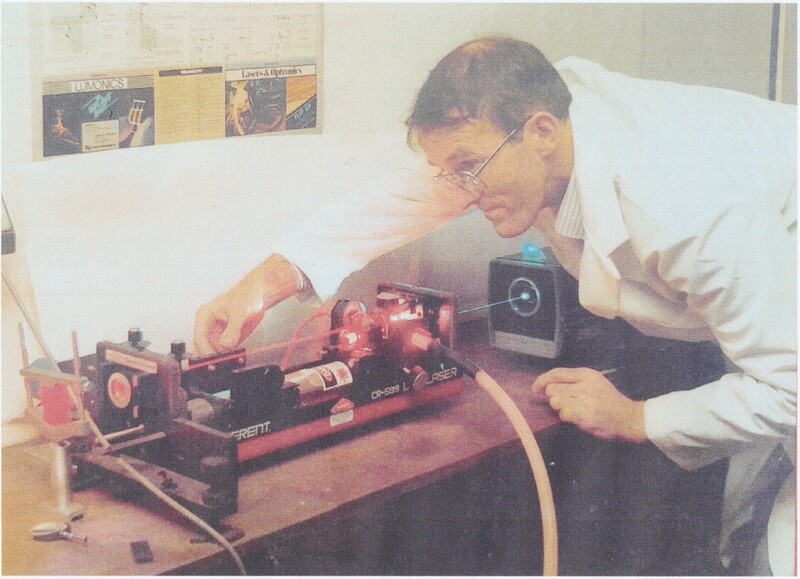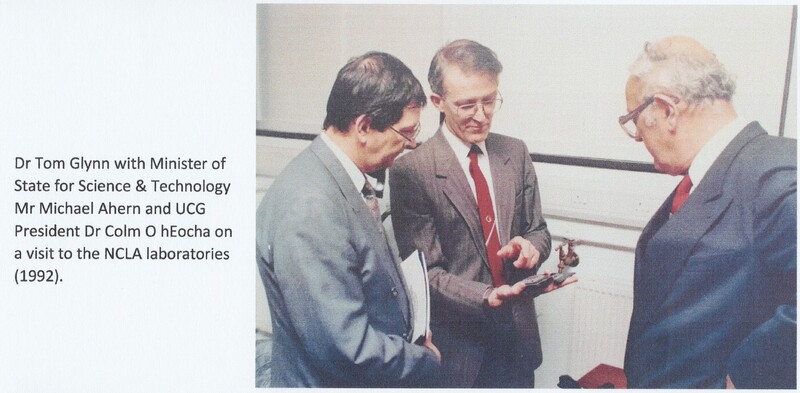High power lasers come to the University of Galway
Item
Format
JPEG
Title
High power lasers come to the University of Galway
Depiction
Picture 1 shows a man in a laboratory setting
Picture 2 shows three men looking at an object
Description
The first laser, using the gemstone ruby as active medium, was operated in 1960. Since then, lasers of increasing power and operating at many different wavelengths have been developed, by using other materials either in solid, liquid, or gaseous forms. In the intervening period, they have transformed the way in which we live, work and play. Using a research grant from EOLAS in 1977, Dr Tom Glynn bought the first high power laser, a gas-based argon laser, for the spectroscopy group in the Dept. of Experimental Physics. After a sabbatical research period in the U.S. in 1982/83, he added a tunable laser, based on a flowing dye solution, which was driven by the argon laser. By selecting the appropriate dye, the wavelength of operation could be tuned over a wide range and was the perfect tool for investigating the spectroscopy of a wide range of materials.
Picture 1 shows Dr Glynn adjusting the output of the red beam of the dye laser in the foreground, which is being driven by the green beam of the argon laser in the background. This system was a valuable and effective tool in the research of several Ph.D students over the following years. By 1989, Dr Glynn had developed an interest in lasers of higher power which could be used in industry for cutting, welding, drilling, marking, and lots of other applications. This led to the setting up of the National Centre for Laser Applications (NCLA), assisted by a strategic research grant from EOLAS (a fore-runner of Enterprise Ireland).
Within a 10-year period, the centre had assembled the largest collection of industrial lasers and diagnostic equipment within third level institutions in Ireland and was working with multinational and national companies on research and development projects. Much of its work was on behalf of multinational medical device companies, many of them in the west of Ireland.
Picture 2 was taken during a visit to the NCLA laboratories by the Minister of State for Science & Technology, Mr Michael Ahern in 1992.
Picture 1 shows Dr Glynn adjusting the output of the red beam of the dye laser in the foreground, which is being driven by the green beam of the argon laser in the background. This system was a valuable and effective tool in the research of several Ph.D students over the following years. By 1989, Dr Glynn had developed an interest in lasers of higher power which could be used in industry for cutting, welding, drilling, marking, and lots of other applications. This led to the setting up of the National Centre for Laser Applications (NCLA), assisted by a strategic research grant from EOLAS (a fore-runner of Enterprise Ireland).
Within a 10-year period, the centre had assembled the largest collection of industrial lasers and diagnostic equipment within third level institutions in Ireland and was working with multinational and national companies on research and development projects. Much of its work was on behalf of multinational medical device companies, many of them in the west of Ireland.
Picture 2 was taken during a visit to the NCLA laboratories by the Minister of State for Science & Technology, Mr Michael Ahern in 1992.
References
Tom Glynn: Private communication via email on 27 June 2024
Contributor
Bibliographic Citation
T J. Glynn, S.G. Jennings, ‘High power lasers come to the University of Galway’, Visual History Retired Staff Collection, University of Galway Digital Collections, Asset Id 15004, Archival Record Id VHRS
Spatial Coverage
Temporal Coverage
Period
1990s
Category
colour
portrait
group
on-campus
indoors
Language
English
Publisher
University of Galway Library
Rights
This image may be used for non-commercial purposes under CC BY-NC-SA
see https://creativecommons.org/licenses/by-nc-sa/4.0/
see https://creativecommons.org/licenses/by-nc-sa/4.0/


